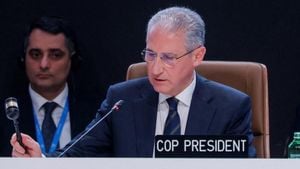With the dust still settling from the last presidential election, the world’s focus is shifting once again on the United States, especially as former President Donald Trump makes headlines with his potential bid for re-election. This time, it’s not just about domestic reactions but how the European political stage is gearing up to respond to the prospect of Trump resuming the White House. While Americans are grappling with the echoes of past policies and their ramifications, European leaders are contemplating what it would mean for transatlantic relations if Trump were to come back to power.
The 2024 election has raised significant concerns among various European nations, primarily due to the tumultuous nature of U.S. policy changes during Trump’s tenure from 2017 to 2021. Many European leaders are watching carefully, and some have even begun to express wary sentiments about the implications Trump's return could have on global issues like climate change and military alliances, particularly NATO. For political analysts, the shift back to Trump feels like déjà vu, with many fearing the unraveling of diplomatic relationships cultivated over recent years.
Trump's previous administration was marked by what some termed 'America First' policies, which often put national interests above global cooperation. Leaders of European countries, from Germany's Angela Merkel to France's Emmanuel Macron, voiced their unease during Trump’s presidency. Many felt his approach jeopardized established alliances and echoed isolationist sentiments. With the chance of Trump re-entering the political fray, officials are bracing for another round of negotiations — or, as some fear, confrontation.
The European Union, alongside individual countries, appears to be preparing for various scenarios, attempting to maintain stability regardless of electoral outcomes. French officials, characterized by their traditional diplomacy, are reportedly discussing strategies to counterbalance U.S. policies if they explore unilateral paths again. This involves enhancing Europe's own military capabilities and fortifying economic ties among EU member states. The discussions also point toward finding allies within the U.S., particularly among Democrats, who may serve as counterweights to Trump's policies, should he win the election.
Germany’s foreign minister has articulated concerns about how Trump’s policy decisions could have severe impacts on the fight against climate change. During his last term, the U.S. withdrew from the Paris Agreement, leaving many environmental initiatives hanging by a thread. Rather than take the chance of history repeating itself, European leaders are prioritizing green energy initiatives and setting more stringent policies within the EU framework to bolster their own credibility on the global environmental stage.
This apprehension extends to economic policies as well. Trump's trade wars, particularly with China, altered the flow of goods globally and threw trade agreements between nations off-balance. European nations have been signaling their intent to bolster their economic resilience to withstand potential economic shocks stemming from U.S. policy shifts. Leveraging trade agreements among countries within Europe is now more urgent, as they aim to lessen dependency on U.S. markets without jeopardizing their competitiveness.
One pivotal area of interest is the future of NATO. Trump often criticized NATO allies for not meeting spending commitments and was notorious for questioning the very existence of the alliance at times. European nations are rallying around maintaining unity within NATO, ensuring they are not left vulnerable to external threats, particularly as tensions with Russia remain high. U.S. involvement is perceived as instrumental, but European leaders are no longer willing to depend solely on American promises; they begin nurturing independent defense initiatives.
There is also concern from European nations surrounding issues of democracy, particularly with Trump’s contentious relationship with democratic norms. Observers point to the January 6 Capitol riot and the subsequent attempts to overturn the election results as worrisome signs of political instability, raising alarm over how the U.S. stands as a beacon of democracy. European officials want to see the U.S. leading by example, particularly as rising authoritarianism influences global politics.
Internationally, European leaders are already collaborating to pivot the discourse around democracy back to centrist values, drawing larger global coalitions resembling traditional alliances, encouraging practices like more transparent governance, and championing democratic values amid rising populism. The UN General Assembly meetings this year might serve as another stage for engaging with these pressing issues, where Trump’s name could still carry weight even if he is not the sitting president.
Meanwhile, as 2024 approaches, analysts notice a divide forming within European capitals. Eastern European nations, particularly those bordering Russia, view Trump's administration more favorably due to his assertive stance against Moscow. Leaders like Poland’s Prime Minister have, at times, expressed admiration for Trump’s no-nonsense attitude toward Russia, even though Trump himself appeared to have conflicting views about NATO’s significance. For these countries, Trump’s return could spell streamline military aid and support against potential threats, emphasizing the need for balancing outcomes depending on the political narrative developing on both sides of the Atlantic.
The question remains, will European leaders adapt successfully to the unpredictable nature of Trump’s return? Observers note the importance of developing diplomatic tools to navigate this new reality. Initiatives focusing on diplomacy and collective security will likely take center stage as nations unearth opportunities for constructive engagement, even amid differing worldviews.
All these strategic updates come with twists and turns, underscoring the necessity for conscientious planning and foresightedness. Whether Trump runs, wins, or loses, one thing is clear: Europe will be ready, methodically assembling responses to tackle whatever is next on the horizon, promoting stability and cooperation against uncertainties.



